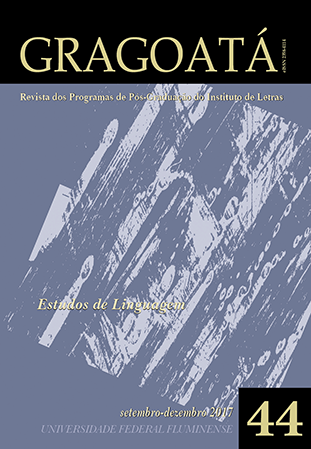Linguistic studies and Digital Humanities: corpus and decorporification
DOI:
https://doi.org/10.22409/gragoata.v22i44.33556Keywords:
digital humanities, post-structuralism, corpus, language instability, computational linguisticsAbstract
Since Saussure, linguistic science relies on the assumption that there is a homogeneous language underlying the variation. This paper seeks to refute this assumption, using as methodology statistical explorations in large corpora. Theories are narratives that try to organize the data at our disposal, and it is therefore reasonable that new data (different both in quantity and quality) produce new narratives. From the perspective presented here, we see language being regular and irregular, without center or periphery. Irregularity is inescapable; language is complicated and simple, simultaneously.
---
DOI: http://dx.doi.org/10.22409/gragoata.2017n44a1015
Downloads
Downloads
Published
Issue
Section
License
Authors who publish in Gragoatá agree to the following terms:
The authors retain the rights and give the journal the right to the first publication, simultaneously subject to a Creative Commons license CC-BY-NC 4.0, which allows sharing by third parties with due mention to the author and the first publication by Gragoatá.
Authors may enter into additional and separate contractual arrangements for the non-exclusive distribution of the published version of the work (for example, posting it in an institutional repository or publishing it in a book), with recognition of its initial publication in Gragoatá.

Gragoatá is licensed under a Creative Commons - Attribution-NonCommercial 4.0 International.











